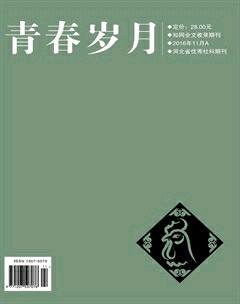A White Heron
白玉杰
Abstract:Not only do we read this story for fun, but also we learn profound lessons from it. A White Heron leads us into a positive, pure world, revealing the influence of difficulties and mightiness of nature before us.
Key words:difficulties; nature; lessons
When I read the beginning of A White Heron, I was greatly attracted by the purity and innocence of Sylvia, the protagonist in this story. Through reading it, I have found so many brilliant ideas implicit in the text. The most two significant ideas portrayed in the text are the value of difficulties and the power of nature.
To begin with, the author clarifies the idea that difficulties create opportunities for us by describing an adventure taken by a small girl, Sylvia. On her way, she has to go through difficulties which are beyond her imagination. “The sharp dry twigs caught and held her and scratched her like angry talons”(90). However, having overcome these difficulties, Sylvia succeeds in reaching the top of the huge pine tree, where she sees a fantastic view and gains a better understanding of herself. She sees “here and there were church steeples, and white villages; truly it was a vast and awesome world” (91).At this moment, she realizes that hurting the white heron is not what she truly hopes; thus, she decides to protect it by saying nothing. It is these difficulties that create the opportunity for her to understand herself. If she does not take the challenge to explore through the forest, she would not experience the wonder of nature and discover her true identity: an innocent child of nature.
As a saying goes, “There is no pleasure without pain.” Sylvia acquires a feast for her eyes and a true self after experiencing difficulties, which proves that difficulties and pain bring more opportunities to improve ourselves. When I first came to America from China, the different culture, language, and teaching system all brought pain to me. I, nevertheless, can at present fully understand professors lectures, fluently communicate with other people in English, and easily catch up with my American classmates. For all these, I should be grateful to those difficulties, for they have trained my will and improved my competence. Therefore, my personal experiences cause me to definitely agree with the author. Difficulties create more opportunities to improve ourselves in physical and mental aspects. Through difficulties, Sylvia finds the “pageant of the world” (92) and decides to be loyal to herself, keeping silence “for a birds sake” (92). Likewise, we can also make much progress after going through difficulties. There are infinite possibilities behind difficulties.
In addition, the author implicitly describes that nature is powerful, for nature is not only a provider but also a leader. Nature provides a wonderful sight for Sylvia: “there was the sea with the dawning sun making a golden dazzle over it” (91). Everything looks amazing to her, and she is astounded by the beauty. Nature shows a fantastic spectacle to her. Moreover, nature leads her to find her true identity through experiencing and feeling it. Initially, she begins the exploration in order to discover the white heron and to please her friend, on whom she has a crush; but after this adventure, she has changed her mind: “she cannot tell the herons secret and give its life away” (92). She no longer blindly subordinates herself to that boy; instead, she finds her true self and her love for nature. She will not betray her true thoughts and values, even if it means that she will get the rebuke from her grandmother and bear the departure of that boy.
Nature creates various creatures on the earth and provides a colorful world and leads us to retrieve the selves who are lost in human society. Thanks to nature, Sylvia witnesses the beauty beyond description and gets her true identity back. “It seemed that as if she never had been alive at all before” (85). Just like her, each of us can find a different world and our true selves in nature. When we are tired of those high buildings and heavy traffic in modern life, we can get close to nature, where we can see the harmonious scenery and enjoy the atmosphere of tranquility. When we find we are lost in social life, we can go on a date with nature, where we can well explore our hearts and regain our initial and truest selves. Nature is always there. When we turn back, we will always see nature. Nature is our loyal friend: she creates amazing scenes to rejoice us and gives sincere advice to us. With the company of nature, we, like Sylvia, can live our lives without dissembling our true characters. In short, nature can provide us big spectacles and lead us to better understand ourselves.
All in all, two crucial ideas are depicted by writing this story: difficulties are valuable, and nature is powerful. The author teaches us to positively deal with difficulties, because we can improve ourselves by overcoming them; she tells us to get close to nature, because we can enjoy ourselves and discover true selves in nature. We will live a much better life if we take the two ideas seriously. These two themes are everlasting truths. They are applicable for not only us but also our descendants, not only this generation but also endless ones.
【Reference】
[1] Paul Negri. Great American Short Stories[M]. Dover Publications, 2002:85-92.

